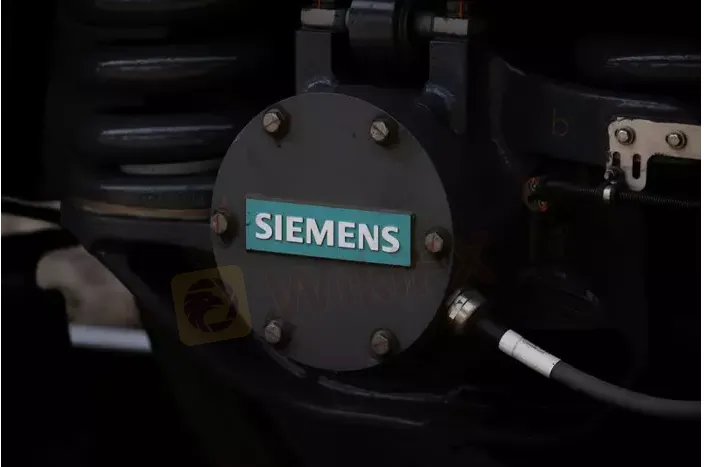简体中文
繁體中文
English
Pусский
日本語
ภาษาไทย
Tiếng Việt
Bahasa Indonesia
Español
हिन्दी
Filippiiniläinen
Français
Deutsch
Português
Türkçe
한국어
العربية
Siemens’ writedown pushes company into first loss since 2010
Abstract:Siemens reported better-than-expected revenues for its third quarter on Thursday as a writedown at Siemens Energy pushed the engineering and technology group into the red for the first time in nearly 12 years.

The maker of industrial software and trains reported revenues rising 11% to 17.87 billion euros ($18.38 billion) – beating analyst forecasts for 17.47 billion euros in a company-gathered consensus.
But Siemens posted a shareholders net loss of 1.66 billion euros after taking a 2.8 billion euro non-cash charge for writing down the value of its stake in Siemens Energy.
The loss, Siemens first quarterly loss since the fourth quarter of 2010, meant Siemens had to cut its full year earnings per share guidance to 5.33 to 5.73 euros per share, from 8.70 to 9.10 euros previously.
Siemens owns a 35% stake in the turbine and wind power company, which has had a troubled two years since spinning off in 2020, with operating problems and losses at its wind turbine division Siemens Gamesa.
Chief Executive Roland Busch said demand was still strong, despite an environment affected by sanctions on Russia, high inflation and ongoing effects from the pandemic.
“We captured significant opportunities in a market environment with ongoing high demand,” he said in a statement.
“Our strong top line momentum continued, with a comparable order growth of 20% since the beginning of fiscal 2022.”
As well as the Siemens Energy charge, the companys figures were also hit by 442 million euro in costs related to its decision to quit Russia following the conflict in Ukraine.
During the three months to the end of June, Siemens said its orders rose to 22.07 billion euros, beating forecasts for 19.82 billion euros. The 7% increase followed a 32% increase in orders in the previous quarter.
Profit at its industrial business rose 27% to 2.88 billion – short of forecasts for 3.02 billion euros.
Siemens, whose products are used to equip factories, buildings and transport networks, is seen as a signifier for the broader industrial economy.
Demand in the European capital goods sector is holding up, Barclays said last week, looking back at the results of other companies in the sector such as ABB and Schneider Electric
Siemens said it has continued to avoid major disruptions caused by supply chain problems, especially around getting enough components, raw materials and logistics.
($1 = 0.9724 euros)

Disclaimer:
The views in this article only represent the author's personal views, and do not constitute investment advice on this platform. This platform does not guarantee the accuracy, completeness and timeliness of the information in the article, and will not be liable for any loss caused by the use of or reliance on the information in the article.
Read more

Top Benefits of Forex Cards
Forex cards enable you to make seamless transactions in foreign currencies when travelling abroad. Check out this guide to learn the benefits of forex cards in detail.

Mule Accounts: The Secret Weapon Fake Forex Brokers Use to Dupe Investors
Explore this story where we have highlighted how fake forex brokers use mule accounts to dupe investors.

Fraud Brokers List for July 2025- EXPOSED
Attention investors and traders! If you want to invest in the forex market, be careful not to choose these scam brokers. This warning list is issued by the Financial Conduct Authority.

Know the Major Risks of UbitMarkets, Before You Invest!
Scam brokers involved in the forex market who act genuine in the beginning but turn out to be frauds in the end. Choosing UbitMarkets could lead you to serious losses. Check out this article to know why we’re saying this.
WikiFX Broker
Latest News
America's Deficit Reckoning: How the U.S. debt spiral could spark a crisis
Treasury yields hold steady as Trump extends tariff deadline
Gold Prices to Fluctuate This Week Amid July 9 Tariff Deadline, Fed Policy
FCA clarifies expectations on bullying, harassment and violence to deepen trust in financial service
XS.com Expands Global Reach with Landmark Kuwait Launch
10 Unlicensed Brokers Exposed – Check Now to Stay Safe!
Exposed: Ibell Markets - A Scam Broker That Does Not Allow Withdrawals
Asia-Pacific markets mostly rise as investors assess Trump's steep tariffs
MT4 vs MT5: A comprehensive comparison in terms of functionality
Top Forex Trading Strategies for the London Session
Currency Calculator


